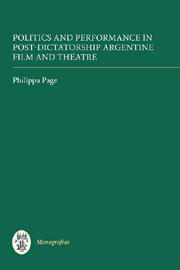Book contents
- Frontmatter
- Contents
- List of Illustrations
- Dedication
- Acknowledgements
- Introduction
- ‘Theatre[s] of Cruelty’ and Politics of Performance in the Work of ‘Teatrista’ Eduardo Pavlovsky and Filmmaker Fernando E. Solanas
- De-mythifying the Postmodern ‘Opium of the People’: Theatre and Cinema versus Television
- ‘Metáforas del Fracaso’ or ‘a Family Romance’? Resuscitating Aesthetic Lineages
- Biodramas/Biography/Biopolitics:Projects of ‘Convivencia’ in New Argentine Cinema and Theatre
- Conclusion
- Filmography
- Bibliography
- Index
De-mythifying the Postmodern ‘Opium of the People’: Theatre and Cinema versus Television
Published online by Cambridge University Press: 05 February 2013
- Frontmatter
- Contents
- List of Illustrations
- Dedication
- Acknowledgements
- Introduction
- ‘Theatre[s] of Cruelty’ and Politics of Performance in the Work of ‘Teatrista’ Eduardo Pavlovsky and Filmmaker Fernando E. Solanas
- De-mythifying the Postmodern ‘Opium of the People’: Theatre and Cinema versus Television
- ‘Metáforas del Fracaso’ or ‘a Family Romance’? Resuscitating Aesthetic Lineages
- Biodramas/Biography/Biopolitics:Projects of ‘Convivencia’ in New Argentine Cinema and Theatre
- Conclusion
- Filmography
- Bibliography
- Index
Summary
No puedo leer, no puedo dormir, no puedo respirar. Cierro los ojos y veo carteles de neón que dicen: ‘COMPRE UNA CASA, UN AUTO, UN BEBÉ Y SEA FELIZ …’ Es como si mi cabeza fuera una máquina repleta de frases de la publicidad, de la televisión, de otras personas …
Lola Arias, Striptease, 11If one were to define a cultural institution, industry or medium as paradigmatic of postmodernity —although arguably not of postmodernism, which allows for a greater diversity of media— it would more likely than not be television. For not only is television emblematic of consumer society ‘mediocrac[ies]’ (Hal Foster 1983: xi) —that is, of the commodification of cultural production and the consequent propagation of (image-)signs throughout society— but, as will emerge here, it plays a fundamental role in constituting its spectators as both social and ideological subjects. A hyper-medium of communicative, epistemological, political and, not least, entertainment value, television is the ‘Ideological State Apparatus’ (see Althusser 2008: 1–60) which both informs and renews the myths of consumer capitalism on which postmodern ‘societ[ies] of spectacle’ are based (see Debord 2004).
Given the ascendance of television, it is hardly surprising that theatre practitioners and filmmakers have felt the need to scrutinise not only the way in which television functions as a medium, but its role in shaping (postmodern) society. This chapter will examine how a series of plays and films in Argentina challenge television's cultural and ideological hegemony by exposing the manner in which TV manipulates the reality we perceive.
- Type
- Chapter
- Information
- Politics and Performance in Post-Dictatorship Argentine , pp. 63 - 95Publisher: Boydell & BrewerPrint publication year: 2011



